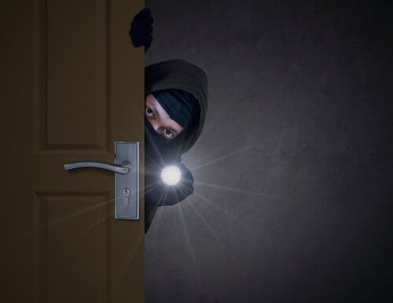Everyone wants to feel safe in their own home, and most people believe that a person should have the right to do whatever is necessary to defend their home against burglars. California’s Castle Doctrine (PC Section 198.5) specifically addresses this issue by specifying what a homeowner is allowed to do to protect their home.
In general, the Castle Doctrine says that is if someone comes into your home uninvited while you are there, you can assume (and the court must assume) that they intend to do you harm.
This gives you the right to defend yourself by any reasonable means, up to and including deadly force. In other words, you don’t have to prove that the intruder intended to do you harm in order to be justified in using whatever force was necessary to defend your household.
Your Home as Your Castle
The Castle Doctrine comes from the idea that every person should be thought of as the king or queen of his or her home or “castle” and thus, must be afforded the right to defend their home with whatever force is necessary.
The Castle Doctrine permits you to use deadly force if necessary to defend yourself and your household against an intruder. Furthermore, unlike in other states, you have no duty to retreat to safety first. Therefore, you are even allowed to chase, attack or restrain the intruder in order to neutralize the threat.
The Use of Deadly Force Under the Castle Doctrine
Under the Castle doctrine, whenever someone breaks into your home and you have a “reasonable fear of imminent peril, or great bodily injury”, you will be justified in using whatever force necessary to defend yourself, including deadly force.
However, in order for the use of deadly force to be justified, the circumstances must meet the following criteria:
- The person entered your home unlawfully;
- The intruder is engaged in an unlawful act;
- You reasonable fear that you, a family member, or any other member of your household may be injured or killed; and
- Neither you nor the members of your household provoked the intruder in any way.
What’s more, you or a member of your household must be in your home when the crime occurs. In other words, if you are outside of your home and see someone inside burglarizing your unoccupied house, the Castle Doctrine may not apply and you can be convicted of assault, battery or homicide if you were to rush inside and attack, injure or kill the burglar.
Self-defense Outside the Home
Not all threatening encounters happen inside the home, but even when outside you still have the right to defend yourself and may be justified in using deadly force if necessary.
Your actions may then be regarded as “justifiable” under California Jury Instructions (CALCRIM #505 and #506), which instruct a jury to find defendants not guilty if they have been charged with homicide, assault, battery, or some other violent crime under the following circumstances:
- They reasonably believed that they were in imminent danger of being killed or suffering great bodily injury;
- They reasonably believed that the immediate use of force was necessary to defend against that threat; and
- They used no more force than was reasonably necessary.
So, if you reasonably believe under the circumstances a person intends on taking your life or inflicting great bodily injury upon you, it may be reasonable, prudent, and proportional to use deadly force to defend yourself.
On the other hand, if you go beyond what is regarded as a reasonable response to a threat, you may face serious legal consequences for your actions. In other words, if someone walks onto your property and simply slaps you, you will most likely not be able to claim self-defense as an excuse for shooting them.
Moreover, you have no license to attack once the moment of imminent danger has passed, and you may not be excused for seriously injuring or killing a person after that. This means that if the person turns to run away from your property and you shoot them, you may not be able to use self-defense as an excuse and may be prosecuted to the full extent of the law.

